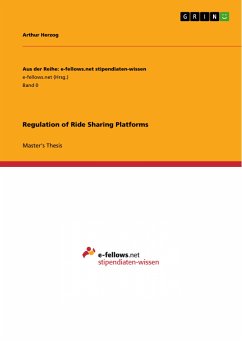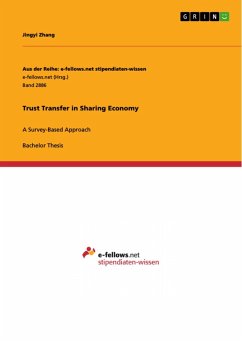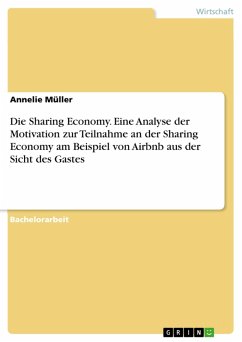Master's Thesis from the year 2018 in the subject Business economics, grade: 1,7, University of Cologne (Faculty of Management, Economics and Social Sciences), language: English, abstract: How should ride-sharing platforms be regulated? The main aim of this master thesis is to provide a framework for regulators, that helps to create an appropriate regulation for ride-sharing platforms in countries like Germany where ride-sharing platforms are currently banned. To achieve that, the main differences between the conventional taxi industry and its new sharing economy entrants are outlined, and a questionnaire is used to empirically identify advantages as well as disadvantages of ride-sharing platforms. Based on these results and on the related literature, new regulatory approaches are developed. With the rise of the internet came the rise of the sharing economy. This sharing economy is characterized by platforms which enable peers to share products and services with other peers. Hereby, these platforms are criticised to disrupt traditional industries. One famous example is the ride-sharing platform Uber which entered the taxi market and competes with conventional taxi organisations. Uber was founded in 2009 and experienced an enormous growth since then. Uber is available in 65 countries, is used by 75 million riders and 3 million drivers, and completes 15 million rides per day. However, Uber is heavily criticised by taxi drivers because they argue that Uber bypasses local licensing and safety laws and amounts to unfair competition. There are many protests by taxi drivers against Uber all over the world. In addition, Uber is criticized for being not safe. For example, the public awareness campaign `Whös driving you?` promotes for-hire vehicle safety and provides a list of safety incidents highlighting the risks of Uber and Lyft. Nevertheless, ride-sharing platforms like Uber offer several advantages to the public, for example user-friendly ride-hailing, cheaper transport prices, and new flexible job opportunities.
Dieser Download kann aus rechtlichen Gründen nur mit Rechnungsadresse in A, B, BG, CY, CZ, D, DK, EW, E, FIN, F, GR, HR, H, IRL, I, LT, L, LR, M, NL, PL, P, R, S, SLO, SK ausgeliefert werden.









